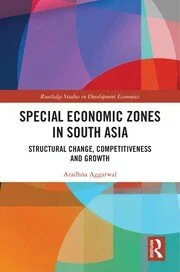WTO – Related Studies
An opportunity to work on WTO related issues came on my way in 2001 when I joined the Indian Council of Research on International Economic Relations (ICRIER) to participate in a project funded by Sir Ratan Tata Trust grant. This three years’ project instituted at ICRIER was part of the capacity building on WTO related issues in India. Participating in this project was a big leap from academic research that I had been involved into after my Doctorate to policy research. It was followed by other projects on WTO related issues including Non Agricultural Multilateral Agreement (NAMA), Regional trading agreements and government procurement.
Projects
The research programme on the WTO-related issues, funded by the Sir Ratan Tata Trust commissioned at ICRIER
My association with this project yielded several publications on antidumping. These studies covered a wide range of topics on antidumping. The first study under the project, Anti-dumping law and practice: an Indian perspective which was published as ICRIER working paper 85 was the first economic analysis of antidumping use in India. It explored the economic rationale of antidumping in the Indian context using the case based data. Other studies included: the trends in worldwide anti-dumping case filings and measures taken during the last two decade; analysis of the macro economic factors that influence the use of anti-dumping in developed and developing countries; and critical reviews of the WTO Agreement on Antidumping and the public interest clause in the Agreement from Indian perspective. These studies reinforce the view that the primary jurisdiction for the anti-dumping law is really more political than economic. It is recommended that further fine-tuning and refining of the anti-dumping policy is not the answer to prevent its (mis)use. We call for fundamental changes in this law. These studies were compiled in an Oxford University published monograph ‘The Anti-dumping Agreement and Developing Countries’.
Impact on Indian industry and restructuring required to adjust to tariff proposals being considered by the Negotiating Group on Market Access (NGMA) at the WTO’ funded by the Department of Industrial Policy and Promotion, Ministry of Commerce and Industry, Government of India and commissioned at ICRIER
This paper quantitatively assesses likely changes in market access opportunities for Indian exports owing to tariff reductions by the USA. The study identifies particular products for India at the ISIC 4-digit level of disaggregation, which could be considered tariff sensitive. Regression analysis of the relationship between MFN tariff rates and India’s exports to the US was used to assess in quantitative terms the likely impact of tariff reduction that may be agreed in the Doha Round. This analysis suggests that tariff cuts are not expected to benefit India’s exports to the US in a major way. The study has also attempted to decompose changes in India’s total exports due to tariff reductions in the US into the competitive and market effects. The analysis suggests that the increase in India’s exports would be mainly due to the competitive effect. This leads the author to conclude that it is crucial for India to improve its competitiveness vis-a- vis its competitors in different markets.
Regional Economic Integration and FDI in South Asia, funded by UNCTAD
This study looks at the effect of deepened regionalism on investment flows. It argues that regional integration has the potential to promote intra and extra regional FDI flows and economic development in individual countries of the region, paving the way for the most efficient use of the region’s resources through additional economies of scale, value addition, employment and diffusion of technology. A number of challenges remain. Structural weaknesses, institutional bottlenecks, political movements, narrow nationalism and mutual mistrust are some of the factors that explain the failure of the region to exploit possibilities. Paradoxically, the problems themselves provide strong motivation for strengthening cooperation. It is only through more intensive collaboration that these complexities can be addressed and resolved.
Agreement on Government Procurement funded by the Ministry of Commerce and Study commissioned at the National Council for Applied Economic Research NCAER
This project reviewed the WTO Agreement on Government Procurement and assessed if India should be a signatory of this agreement.




Wow, great blog post.Really thank you! Really Cool.
You have brought up a very superb points, regards for the post. Maribeth Dion Goodhen